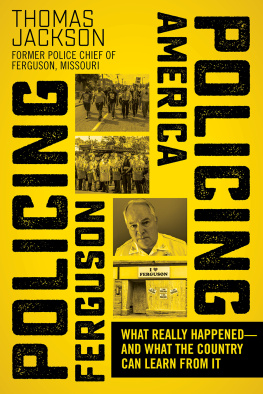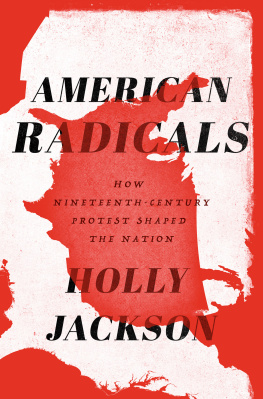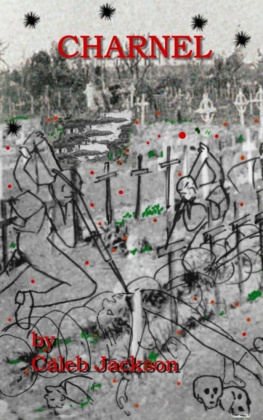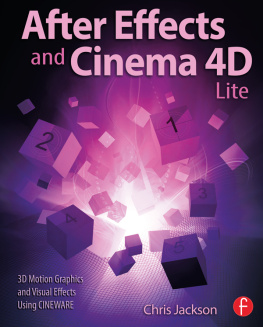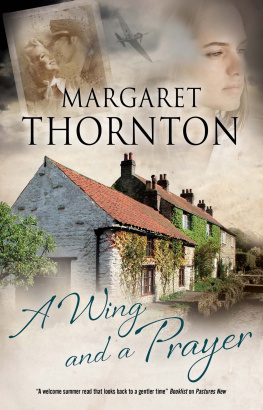Copyright 2017 by Thomas Jackson
All rights reserved. No part of this book may be reproduced in any manner without the express written consent of the publisher, except in the case of brief excerpts in critical reviews or articles. All inquiries should be addressed to Skyhorse Publishing, 307 West 36th Street, 11th Floor, New York, NY 10018.
Skyhorse Publishing books may be purchased in bulk at special discounts for sales promotion, corporate gifts, fund-raising, or educational purposes. Special editions can also be created to specifications. For details, contact the Special Sales Department, Skyhorse Publishing, 307 West 36th Street, 11th Floor, New York, NY 10018 or .
Skyhorse and Skyhorse Publishing are registered trademarks of Skyhorse Publishing, Inc., a Delaware corporation.
Visit our website at www.skyhorsepublishing.com.
10 9 8 7 6 5 4 3 2 1
Library of Congress Cataloging-in-Publication Data is available on file.
Cover design by Brian Peterson
Cover photo credit: Steve Pellegrino
Interior photos: Steve Pellegrino
Print ISBN: 978-1-5107-1976-7
Ebook ISBN: 978-1-5107-1977-4
Printed in the United States of America
This book is dedicated to the thin blue line, which remains unbroken.
Contents
_______________
Preface
_______________
T he name of Ferguson, Missouri, means a lot of different things to different people. To me, it means home. Its where I staked my life and my livelihood.
My father moved our family from my boyhood home in Pittsfield, Massachusetts, in 1966 to take a job as an electrical engineer at Emerson Electric Company in Ferguson. He and my mother also owned a paint and crafts shop (one block from the police station) where I worked when I was in high school.
So much of what people believe about what happened in Ferguson, and about the town and its people, is completely untrue, thanks to the news media, the internet, and a deeply flawed government examination. Still, some of the larger issues that Ferguson has come to represent are real, and of critical importance to the future of the country. I do hope to set the record straight, not just about the shooting and the police response to it, but about what America can and should expect from its law enforcement professionals. What was considered a noble, maybe even heroic, calling only a few years ago became the perceived source of all of Americas woes practically overnight.
In writing this book, I hope to do my part in restoring the public trust to police, but I dont want the discussion about policing to continue to serve as a distraction from more basic social concerns. Failing programs that get in the way of the very benefits they were intended to provide have created a cycle of poverty and stagnation that law enforcement deals with every day. I hope to share my experience in a way that opens that conversation and starts us on a path toward policeall citizens, in factplaying a more proactive role in improving the lives of all Americans.
Introduction
_______________
I n August 2014, on a hot Saturday afternoon in Missouri, Officer Darren Wilson of the Ferguson Police Department shot and killed Michael Brown. America was transfixed for months by the protests, the riots, the never-ending news cycle. What was considered a noble, even heroic callingpolice workcame to be perceived as the source of Americas woes practically overnight. The name of Ferguson became shorthand for institutional racism and police brutality.
I was the chief of police for Ferguson. The incident that resulted in the death of Michael Brown, and the terrible aftermath that all but destroyed the town, happened on my watch.
I spent months on the hot seat, the primary focus of a nations outrage. It was probably more important to me than to anyone else to understand where that anger came from, to realistically assess how much of it was justified, and how much resulted from people jumping to conclusions based on a dangerous cocktail of provocative media reports and inflammatory pronouncements by politicians and activists, amplifying misperceptions that had spread on the internet faster than any investigation could possibly proceed.
Since resigning my post, in the wake of the US Department of Justices scathing report, Ive had the time and motivation to examine all the things said about Ferguson. Even if there werent lawsuits that required me to be clear about the facts, I needed to know for my own peace of mind where people came up with the claims they made about my force and our town. As a professional, I wanted to know what we were doing wrong and how to fix what could be fixed, even if my days as chief in Ferguson were over.
This book is a product of that examination.
I cannot begin without first addressing two things: the Department of Justice report on Ferguson and the fact that there was so much coverage of events in Ferguson that people say, I know what I saw. You cant deny it.
You know what you saw. Theres a difference between, I know what I saw, and I know what I was shown. Even if you came to Ferguson to see with your own eyes, there were places you couldnt have gone, meetings you couldnt have attended. All I ask is that you give me a chance to show you what wasnt shown, to take you where you couldnt have gone.
The DOJ report, though, needs to be discussed right here, right off the bat.
Attorney General Eric Holder of the Department of Justice first arrived in Ferguson eleven days after the shooting. He spoke with Michael Browns mother. He talked of his own experiences with prejudice. He stated publicly that his pledge included, as opposed to simple justice, robust action, and he stated that long after the events of August 9 have receded from the headlines, the Justice Department will continue to stand with this community. The things he said and did added up to a tacit confirmation of the public fear that wrong had been done, the shooting had been bad, and that prejudice was a factor. And it was all broadcast live. It not only cemented the Department of Justices biased stance in the upcoming investigation but also turned up the heat of public anger. He made the job of law enforcement even harder than it already was, putting the public and police both at greater risk.
Attorney General Holder did all of this more than three months before the investigation into the shooting concluded. Three months before the facts were in. His mind was made up before he arrived in town. Following his August 20 pledge and his September resignation, Holder appeared at the Washington Ideas Forum on October 29, where he declared, I think its pretty clear that the need for wholesale change in that department [Ferguson] is appropriate.
The Los Angeles Times later quoted sources in the Justice Department saying, The more he gets out in front publicly, the more he will be expected to deliver criminal charges the situation could reach a tipping point where federal criminal charges would be the only way to vindicate Holders public comments.
Then the investigations into the shooting concluded and the forensics showed that the narrative that had gained such traction with the public didnt fit the evidence. The officers version of events did. To those who right here would immediately jump to thinking staged scene, cover-up, I have included an appendix so you can read the findings yourself. Mind you, what Ive included is not from an internal police investigationits from a federal investigation, because the FBI (a division of the DOJ) was sent to look into this at the same time that Holder was sent.

